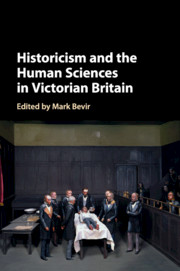Book contents
- Historicism and the Human Sciences in Victorian Britain
- Historicism and the Human Sciences in Victorian Britain
- Copyright page
- Contents
- List of Contributors
- 1 Historicism and the Human Sciences in Victorian Britain
- 2 Life
- 3 Race
- 4 Language
- 5 Literature
- 6 Moral Character
- 7 History
- 8 Political Economy
- 9 Empire
- 10 International Law
- Index
1 - Historicism and the Human Sciences in Victorian Britain
Published online by Cambridge University Press: 20 April 2017
- Historicism and the Human Sciences in Victorian Britain
- Historicism and the Human Sciences in Victorian Britain
- Copyright page
- Contents
- List of Contributors
- 1 Historicism and the Human Sciences in Victorian Britain
- 2 Life
- 3 Race
- 4 Language
- 5 Literature
- 6 Moral Character
- 7 History
- 8 Political Economy
- 9 Empire
- 10 International Law
- Index
Summary
- Type
- Chapter
- Information
- Publisher: Cambridge University PressPrint publication year: 2017
- 1
- Cited by



